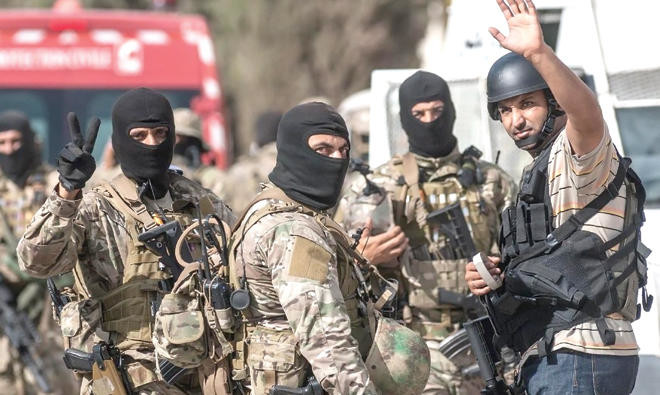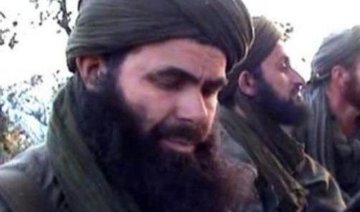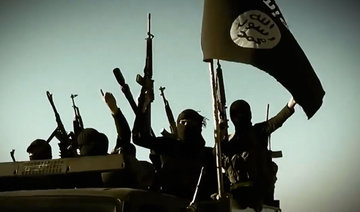TUNIS/ALGIERS: The killing of a senior Algerian militant by special forces soon after he slipped into Tunisia has raised concern that Al-Qaeda is trying to regroup in the North African state as rival Daesh has suffered major setbacks, security sources say.
Last month, Tunisian special forces killed Bilel Kobi, a top aide to Abdelmalek Droukdel, better known as Abu Musab Abdul Wadud, the leader of Al-Qaeda in the Islamic Maghreb (AQIM), in a mountainous region along the Tunisian-Algerian border.
Kobi was on an apparent mission to reunite splinter groups of Al-Qaeda fighters in Tunisia, putting the army on alert for more infiltrations, a senior Tunisian security source said.
AQIM was the dominant militant force in North Africa, staging several high-profile deadly attacks until 2013 when it fractured as many militants flocked to the more extremist Daesh as it seized territory in Iraq, Syria and Libya.
Daesh became a major recruiter for disaffected, often unemployed young men especially from Tunisia, where poverty has spread since the uprising that toppled Zine El-Abidine Ben Ali in 2011 and induced protracted turmoil.
But Daesh’s appeal has waned since it lost all its territorial strongholds in neighboring Libya as well as in Iraq and Syria to counter-offensives by security forces, with fighters returning home or looking for new causes to join.
That has prompted AQIM to try to lure new talent from among Daesh veterans, two Tunisian security sources told Reuters.
“Al-Qaeda wants to invest in a recent decline of Daesh to reorganize and re-emerge as it seeks to restructure especially in Algeria, Libya and Tunisia by naming new local leaders on the ground,” one of the security sources said.
Kobi was not the only senior militant sent to reorganize Al-Qaeda in Tunisia. Hamza Al-Nimr, an Algerian who joined Al-Qaeda in 2003, was dispatched to lead a cell in Tunisia but was killed with Kobi in the same operation, Tunisian security sources say.
Beefed up by Western countries, Tunisia’s security forces have managed to pre-empt any major attack since a Daesh militant shot dead 39 foreigners on a Mediterranean beach in June 2015, but authorities remain on alert.
In December, the UAE briefly banned Tunisian women from boarding flights to Dubai over a perceived terrorist threat.
Hundreds of Tunisians have joined militant groups abroad but it is unclear how many have returned as significant numbers of them were killed in Syria combat and elsewhere, officials say.
AQIM has remained active in North Africa’s largely desert and often scarcely governed Sahel region, such as in Mali where it focused its activities after Daesh emerged in force to the north in Libya and Tunisia.
AQIM’s Tunisian branch, called Okba Ibn Nafaa, is fractured into four groups based in the remote, northwestern Kasserine and Kef mountains region near Algeria.
Their command structure is dominated by Algerians while a rival group loosely associated with Daesh based in the same region is run by Tunisians, Tunisian security sources say.
Kobi, among others before, had been sent to bring the Al-Qaeda spinoff groupings back together, they said.
“Okba has dozens of fighters; each group is comprised of up to 20 terrorists,” one Tunisian source said.
Okba had targeted police and army forces, he said, unlike the Daesh focus on killing civilians, such as on the Sousse beach.
Tunisia is monitoring the border in close cooperation with Algeria, which prides itself in having prevented any attack since a veteran AQIM commander, Mokhtar Belmokhtar, claimed a strike on a desert natural gas plant in 2013.
There are indications of AQIM fighters trying to cross into Tunisia as Algeria’s army has cracked down on AQIM in the past two weeks, killing eight militants east of the capital Algiers and then the group's media chief a few days later.
“AQIM is in decline (in Algeria), it can’t restructure or redeploy here,” an Algerian security source said.
But a Tunisian security source said a regional AQIM commander remained in eastern Algeria intent on revamping the organization across North Africa, not just in Tunisia.
Al-Qaeda trying to regroup in Tunisia after Daesh setbacks: Sources
Al-Qaeda trying to regroup in Tunisia after Daesh setbacks: Sources

Qatari emir and Turkish president discuss Israeli attacks on Iran

- Sheikh Tamim bin Hamad Al-Thani and Recep Tayyip Erdogan emphasize important need to deescalate conflict and find diplomatic solutions
LONDON: Sheikh Tamim bin Hamad Al-Thani, the Emir of Qatar, and Turkish President Recep Tayyip Erdogan on Tuesday discussed Israel’s ongoing attacks on Iran, which began on Friday and have targeted nuclear sites, military leaders, intelligence chiefs and atomic scientists.
During their call, the leaders emphasized the important need to deescalate the conflict and find diplomatic solutions, the Qatar News Agency reported.
Earlier in the day, the Qatari minister of state for foreign affairs, Mohammed Al-Khulaifi, warned during a call with Rafael Grossi, the director general of the International Atomic Energy Agency, that the targeting of Iranian nuclear facilities by Israel represented a serious threat to regional and international security.
The IAEA reported on Monday that an Israeli airstrike on Iran’s Natanz Nuclear Facility on Friday had damaged centrifuges at the underground uranium-enrichment plant, raising concerns about possible radiological and chemical contamination in the area.
Qatari minister of state, IAEA chief discuss ‘serious threat’ of Israeli strikes on Iran’s nuclear sites

- Mohammed bin Abdulaziz Al-Khulaifi reiterates Qatar’s condemnation of attacks on Iranian territory
- He said targeting nuclear facilities threatens regional, international security
LONDON: The Qatari Minister of State for Foreign Affairs Mohammed bin Abdulaziz Al-Khulaifi on Tuesday discussed the conflict between Israel and Iran with Rafael Grossi, the director general of the International Atomic Energy Agency.
Al-Khulaifi discussed in a call the Israeli attacks on Iranian nuclear facilities that began on Friday, targeting the Natanz, Fordo, and Isfahan nuclear sites.
Al-Khulaifi stressed that targeting nuclear facilities was a serious threat to regional and international security. He reaffirmed Qatar’s commitment to dialogue to resolve conflicts and achieve peace in the region.
The officials discussed ways to improve the security of nuclear facilities and ensure they are safeguarded against threats, the Qatar News Agency reported.
Al-Khulaifi reiterated Qatar’s strong condemnation of the Israeli attacks on Iranian territory, deeming them blatant violations of Iran’s sovereignty and security, the QNA added.
The IAEA reported on Monday that the Israeli airstrike on Iran’s Natanz facility on Friday damaged the centrifuges of the underground uranium enrichment plant, raising concerns about potential radiological and chemical contamination in the area.
US pulls out of two more bases in Syria, worrying Kurdish forces

- The SDF did not respond to questions about the current number of troops and open US bases in northeastern Syria
AL-SHADADI BASE: US forces have pulled out of two more bases in northeastern Syria, visiting reporters found, accelerating a troop drawdown that the commander of US-backed Syrian Kurdish forces said was allowing a resurgence of Daesh.
The reporters who visited the two bases in the past week found them mostly deserted, both guarded by small contingents of the Syrian Democratic Forces — the Kurdish-led military group that Washington has backed in the fight against Daesh for a decade.
Cameras used on bases occupied by the US-led military coalition had been taken down, and razor wire on the outer perimeters had begun to sag.
A Kurdish politician who lives on one base said there were no longer US troops there. SDF guards at the second base said troops had left recently but refused to say when.
HIGHLIGHTS
• No US troops present at Al-Wazir and Tel Baydar bases.
• Daesh threat ‘has significantly increased’, SDF commander says.
The Pentagon refused to comment.
It is the first confirmation on the ground by reporters that the US has withdrawn from Al-Wazir and Tel Baydar bases in Hasaka province.
It brings to at least four the number of bases in Syria US troops have left since President Donald Trump took office.
Trump’s administration said this month it will scale down its military presence in Syria to one base from eight in parts of northeastern Syria that the SDF controls.
The New York Times reported in April that troops might be reduced from 2,000 to 500 in the drawdown.
The SDF did not respond to questions about the current number of troops and open US bases in northeastern Syria.
But SDF commander Mazloum Abdi, who spoke at another US base, Al-Shadadi, said the presence of a few hundred troops on one base would be “not enough” to contain the threat of Daesh.
“The threat of Daesh has significantly increased recently. But this is the US military’s plan. We’ve known about it for a long time ... and we’re working with them to make sure there are no gaps and we can maintain pressure on Daesh State,” he said.
Abdi spoke on Friday, hours after Israel launched its air war on Iran. He refused to comment on how the new Israel-Iran war would affect Syria, saying simply that he hoped it would not spill over there and that he felt safe on a US base.
Hours after the interview, three Iranian-made missiles targeted the Al-Shadadi base and were shot down by US defense systems, two SDF security sources said.
Daesh ruled vast swathes of Iraq and Syria from 2014 to 2017 during Syria’s civil war.
Regional war puts Palestinian disarmament in Lebanese camps on hold

- Dimashkieh affirmed that “the dialogue committee is fully committed to the joint statement issued by the Lebanese and Palestinian presidents”
- Palestinian sources told Arab News that significant resistance has emerged within Palestinian ranks over Abbas’s quick acceptance of disarmament deadlines
BEIRUT: A Palestinian official in Lebanon announced “the postponement of the scheduled collection of weapons from Palestinian refugee camps due to the current situation in the region.”
The announcement came just hours before the Lebanese government was set to begin disarming Palestinian refugee camps in Beirut and its suburbs this week.
Citing a Lebanese official familiar with Palestinian affairs in Lebanon, Palestinian news agency WAFA stated that “Palestine renewed its commitment to the joint statement issued on May 21 following the meeting held between Lebanese President Joseph Aoun and President Mahmoud Abbas in Beirut.”
He added that the statement emphasized “Lebanon’s sovereignty, the extension of state authority, and the exclusive right of the Lebanese state to bear arms, as well as the need to end any manifestations outside its authority.
“Palestinian security and military bodies will begin full cooperation with the Lebanese security forces as agreed upon when conditions permit and after the necessary preparations are completed,” the official said.
On the Lebanese side, the only statement issued in this regard was by Ramez Dimashkieh, head of the Lebanese-Palestinian Dialogue Committee, who said that “he received a call from Azzam Al-Ahmad, secretary-general of the Palestine Liberation Organization, during which they discussed the latest developments.”
Dimashkieh affirmed that “the dialogue committee is fully committed to the joint statement issued by the Lebanese and Palestinian presidents, which clearly emphasized respect for Lebanese sovereignty, the principle of exclusive state control over weapons, and the necessity of ending the visible presence of Palestinian arms, according to a specific timeline.”
Youssef Al-Zari’i, Fatah’s media representative in Sidon, confirmed that Palestinian factions, including Fatah and Islamic movements, all expressed willingness to hand over weapons and allow Lebanese authority throughout the country.
However, he argued that delays are “reasonable given the delicate regional situation,” with implementation tied to evolving Middle Eastern dynamics.
Palestinian sources told Arab News that significant resistance has emerged within Palestinian ranks over Abbas’s quick acceptance of disarmament deadlines. “Multiple Palestinian factions, particularly within Fatah, are uncomfortable with Abbas’s hasty agreement to weapon collection schedules,” one insider said.
Beyond regional timing issues, fundamental questions about execution mechanisms remain unresolved.
“Fatah claims it holds limited heavy weapons in Lebanese camps compared to other groups, especially Hamas,” a source said.
Since Fatah’s weapons belong to the internationally recognized Palestinian Authority and operate under Lebanese oversight, unilateral disarmament could create dangerous imbalances.
“If Fatah surrenders its arsenal while Hamas and affiliated groups retain theirs, Fatah becomes vulnerable within camp dynamics,” the source warned.
Hamas continues defending its Lebanese weapons as legitimate resistance tools while deflecting surrender demands through broader political arguments. The group links disarmament to comprehensive refugee solutions, including return rights and enhanced social protections for displaced populations in Lebanon.
Palestinian camps across Lebanon emphasize that sustainable solutions must address living standards, legal rights including property ownership, while maintaining respect for Lebanese sovereignty and law.
The Lebanese and Palestinian presidents announced in a joint statement issued following their meeting a few weeks ago “the formation of joint committees to address the issue of Palestinian weapons in refugee camps and to monitor the situation in the Palestinian camps.”
They affirmed their commitment to the principle of placing all weapons under Lebanese state control.
According to a joint Lebanese-Palestinian census conducted in 2017, the number of Palestinian refugees in Lebanon is estimated at around 200,000. Many live in harsh conditions within camps overseen by Palestinian factions and forces, which consider the possession of arms as integral to both the right of return and the broader struggle for the liberation of Palestine.
Lebanon is home to 12 official Palestinian refugee camps, along with dozens of other communities dispersed across the country.
The presence of weapons in Palestinian camps in Lebanon dates back to the 1969 Cairo Agreement between the PLO and the Lebanese government.
The agreement stipulated that Palestinians were permitted to establish military bases in southern Lebanon and conduct political activities within the camps, effectively legitimizing armed Palestinian presence on Lebanese soil and in camps.
However, following a civil war in which Palestinian weapons played a dominant role, Lebanon officially annulled the agreement in 1987.
Weapons are distributed unevenly among the camps. Heavy weapons are found in the Ain Al-Hilweh camp, the most overcrowded camp and home to the various politically and militarily diverse factions, and in the Rashidieh camp in the Tyre region.
This is in contrast to the Nahr Al-Bared camp in the north, which is completely devoid of weapons. It has been under the control of the Lebanese Army since 2007, following violent battles that lasted for more than three months between the Lebanese Army and Fatah Al-Islam, which launched attacks against the military that killed dozens.
The disarmament process was scheduled to begin this week in the Shatila, Mar Elias, and Burj Al-Barajneh camps in Beirut and its southern suburbs.
“A committee was supposed to be formed to oversee implementation. There were discussions about assigning this role to the Lebanese-Palestinian Dialogue Committee, which was seen by some as the appropriate authority. However, others dismissed it as a political body unrelated to the issue. This raised further questions: Who would assume responsibility for internal Palestinian affairs once weapons were handed over? Who would manage security inside the camps? And who would handle the cases of wanted individuals and those who had taken refuge there?” a Palestinian source stated.
In recent months, the Lebanese Army has confiscated weapons from Palestinian military sites supported by the Syrian regime and located in the Bekaa Valley on the border with Syria. The most important of these was a base in Qusaya belonging to the Popular Front for the Liberation of Palestine, General Command and Fatah Al-Intifada, confiscating their equipment and ammunition.
Before the outbreak of the Nahr Al-Bared camp battles, Lebanese political leaders had agreed during national dialogue talks to disarm Palestinians outside the camps within six months.
This commitment was later echoed in the 2008 Doha Agreement, which outlined a national defense strategy that included addressing Palestinian arms both inside and outside the camps.
However, these decisions were never implemented. In the years that followed, Ain Al-Hilweh, the largest Palestinian refugee camp in Lebanon, repeatedly witnessed violent clashes among rival Palestinian factions.
Israel closes Al-Aqsa Mosque, Church of the Holy Sepulchre under ‘emergency’ measures

- Most shops in Jerusalem’s Old City have been closed, with only essential stores remaining open since Friday
- Palestinians in Jerusalem fear for their safety due to lack of proper shelters amid Israel-Iran conflict
LONDON: Israeli authorities in occupied East Jerusalem have imposed a closure for the fifth consecutive day on the Al-Aqsa Mosque and the Church of the Holy Sepulchre while barring non-resident visitors from entering the Old City.
Israel announced a state of emergency after beginning airstrikes against Iran on Friday. Tehran retaliated by launching ballistic missiles at Israeli coastal towns and cities. Israel’s emergency measures prevented Palestinians and worshipers from entering the Al-Aqsa Mosque and its courtyards, as well as the Church of the Holy Sepulchre.
The Palestinian Authority’s Jerusalem Governorate added on Tuesday that most shops in the Old City had been closed, with only essential stores remaining open since Friday, Wafa news agency reported.
Israeli authorities have permitted settlers to visit the area surrounding the Al-Aqsa compound and perform Jewish prayers and rituals, while forces have intensified daily raids on Palestinian towns and suburbs in Jerusalem, including the Mount of Olives, Silwan, Issawiya, Shufaat, Hizma, Eizariya, Bir Nabala and Al-Ram, Wafa added. East Jerusalem is surrounded by 84 checkpoints and barriers, including recently installed earth mounds and gates.
Although Jerusalem has been spared so far from the Israel-Iran conflict, Palestinians in the city fear for their safety due to a lack of proper shelters within their towns and neighborhoods, Wafa reported.
Israeli authorities in Jerusalem have announced the opening of schools to be used as shelters from Iranian missile attacks. However, some Palestinian experts warned that the facilities may not be large enough to accommodate a significant number of residents, and some are even unsuitable for receiving civilians.





















